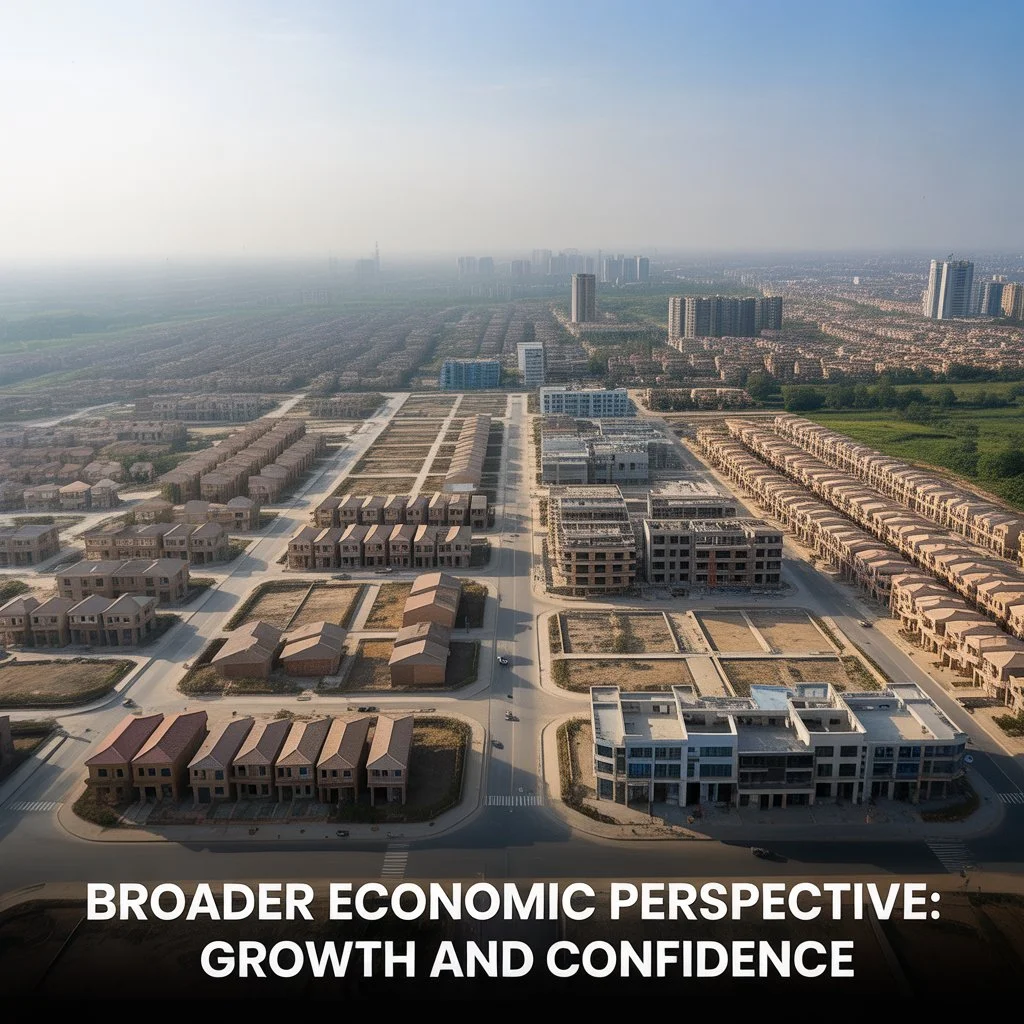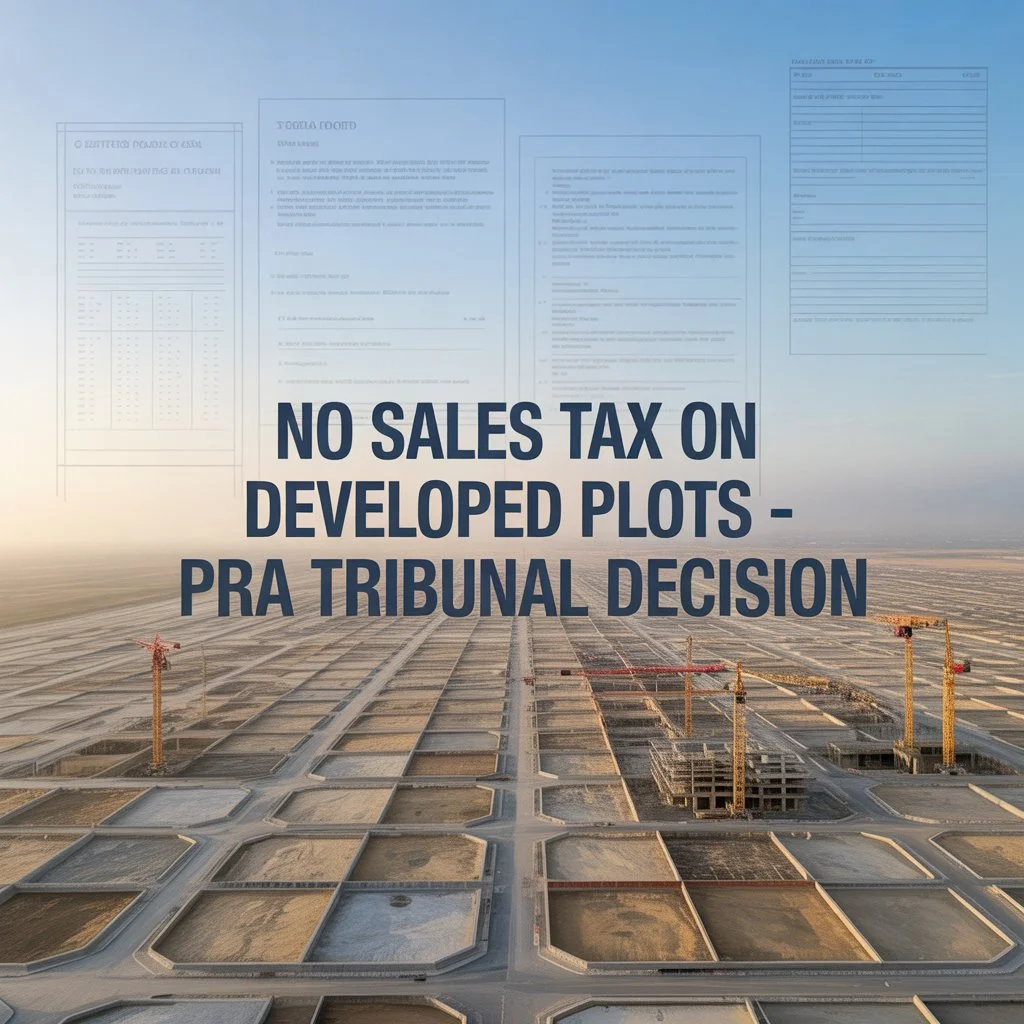In a major development for Pakistan’s real estate sector, the PRA Tribunal has granted a much-awaited sales tax exemption on the sale of developed plots in Punjab. This landmark decision has provided significant real estate tax relief to property developers, clarifying a long-standing legal ambiguity under the Punjab Sales Tax on Services Act 2012. The ruling not only relieves developers from an unnecessary tax burden but also establishes an important precedent for developers in Pakistan, marking a turning point in provincial property taxation.
The Tax Dispute in Punjab’s Real Estate Sector
For years, Punjab sales tax authorities had been issuing show-cause notices to real estate firms, demanding plot sales tax payments for the transfer of developed plots. These notices were issued under serial no.15 of the Second Schedule of the Punjab Sales Tax on Services Act, which imposes tax on certain real estate “services.”
However, developers argued that the sale of developed plots does not constitute a “service,” but rather an outright sale of immovable property. According to them, taxation should only apply to lease, license, or similar arrangements, not to direct transfers of ownership. This distinction between a service and a property sale became the core of the legal debate.
The Appellate Tribunal of the Punjab Revenue Authority (PRA) recently ruled in favor of the developers, concluding that the sale of developed land is not a taxable service under the Act. This has now created a major tax relief for developers, protecting them from undue provincial taxation.
The Tribunal’s Legal Reasoning
The Appellate Tribunal of the Punjab Revenue Authority examined several provisions of the Punjab Sales Tax on Services Act, 2012, to reach its conclusion. The Tribunal observed that Section 10(1), which serves as the charging section, applies only to the ‘value of a taxable service.’ Furthermore, Section 3 defines a taxable service as one rendered ‘in the course of an economic activity.’
Importantly, Section 6(1)(b) defines economic activity as ‘the supply of immovable property by way of lease, license, or similar arrangement.’ The Tribunal noted that an outright sale of developed plots is not included within this scope. Hence, such transactions constitute a transfer of ownership, not a service provision, and are therefore outside the purview of provincial sales tax law.
The decision aligns with the developers’ argument that transfer of ownership through sale differs fundamentally from temporary possession or licensing arrangements. In simple terms, selling a developed plot is a property transfer, not a service provision, and hence not taxable under provincial sales tax law.
Relief for Real Estate Developers and Builders

This PRA Tribunal ruling brings immense relief for developers, especially those engaged in residential and commercial projects across Punjab. Many developers had faced financial strain and uncertainty due to ambiguous tax demands. The new interpretation effectively means that developers no longer have to pay provincial sales tax on the sale of developed plots, ensuring a fairer and more predictable taxation environment.
Furthermore, this clarification improves cash flow for developers, enabling them to reinvest in new housing projects and infrastructure development. The ruling may also encourage more investment into the real estate and construction sectors, which are major contributors to Pakistan’s GDP and employment.
Impact on Property Buyers and the Real Estate Market
For buyers, the Tribunal’s decision translates to potential cost savings. Since developers will no longer include sales tax in the final plot price, buyers may enjoy slightly lower property costs. This could also stimulate property transactions and increase demand in Punjab’s urban areas, including Lahore, Faisalabad, and Rawalpindi.
By removing additional taxes on developed plots, the Punjab real estate market is likely to experience renewed growth and greater investor confidence. The decision enhances transparency and legal certainty two factors essential for sustainable development in Pakistan’s property sector.
How the Ruling Affects Legal and Financial Compliance
Developers must ensure that their transactions are clearly documented as outright sales and not structured as leases or licenses. The Tribunal’s relief applies strictly to ownership transfers, so any service-based agreements may still be taxable. Proper documentation, registration, and legal proof of sale will remain critical in claiming the PRA sales tax exemption.
Additionally, developers should review their contractual clauses and financial reporting to align with the new interpretation. Firms that had already paid taxes under protest may now have legal grounds to seek refunds or adjustments, depending on their case history.
Broader Economic Perspective

This ruling could encourage real estate developers to expand projects in Punjab, knowing that developed land sales are free from provincial tax liabilities. It may also encourage similar petitions or reforms in other provinces, particularly in Sindh and Khyber Pakhtunkhwa, where provincial tax authorities often interpret service laws differently.
Moreover, the decision strengthens investor confidence by showing that regulatory bodies and tribunals are willing to interpret laws fairly and rationally. As Pakistan’s property market continues to grow, such legal clarity is vital for sustainable and transparent urban development.
Conclusion: A Step Toward Fair Taxation and Growth
The PRA Tribunal’s verdict marks a significant step forward in rationalizing Pakistan’s real estate tax system. By confirming that the sale of developed plots is not a taxable service, it brings genuine relief for developers and enhances the credibility of the legal and regulatory framework.
This tax relief for real estate developers in Punjab sets a precedent that may redefine property taxation standards across the country. As the real estate sector adapts to this decision, both developers and property buyers stand to benefit from reduced costs, greater transparency, and renewed confidence in the future of Pakistan’s housing market.
Want to know more? Check out Pakistan’s 3.04% GDP Growth Sparks Real Estate Revival in Faisalabad
Like, share and comment: Facebook, Instagram, Youtube and TikTok.





Join The Discussion